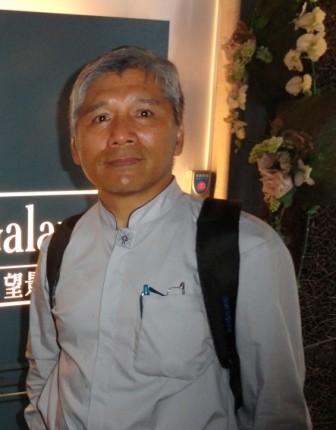For three years he hunted and trapped in the central mountain area of Taiwan until one day Frank Chen’s father suggested his son go down to the capital city and see about enrolling in Taiwan College and Theological Seminary in the country’s capital, Taipei.
The senior Chen was the first pastor of the Tsou tribe. Although he was highly respected, Chen’s family of seven was poor and his son was going to have to make his own way through school.
Taking the long trek down to the train station on foot, the young Chen embarked on a trail that was to take him from his Tsou village to Pittsburgh Theological Seminary in the United States and from there to the post of head chaplain of the Changhua Christian Hospital complex of nine hospitals.
Nothing in Chen’s life had prepared him for academia. His elementary school teacher, a non-aboriginal from the city, assigned the young boy to cleaning and cooking for him. As a result Chen moved on to secondary school unable to speak anything but his mother tongue and able only to sign his name in Mandarin.
Fortunately he was a skilled athlete and was promoted through secondary school primarily on the basis of his athletic skills. Unfortunately this meant he left school with limited literacy skills.
By a miracle he was admitted to the seminary, despite having failed the entrance exam. It was the then general secretary of the Presbyterian Church in Taiwan (PCT), Gao Zhunming, who insisted Chen be accepted. Gao argued that it would be good to admit the school’s first Tsou student to mark its upcoming centenary.
But there was one condition ― Chen must earn a 70 per cent average in each of his first year classes or be expelled. Student tutors were assigned to him for each subject. He worked hard and his young mentors sweated: their honor as much as his depended on his success. There was a huge celebration when at year-end it was announced that his grade average was 70.5 per cent.
Chen graduated in 1982.
When Chen’s future mother-in-law challenged him to earn a Master’s degree in theology before marrying her daughter, Chen won a scholarship to Pittsburgh Seminary. His English was weak and he spent one year in virtual silence until he gained enough confidence to speak. Three years later he came back to marry and was offered a position as chaplain at Changhua Christian Hospital.
Today Chen heads a chaplaincy staff of 40 pastoral caregivers and chaplains and is part of the hospital complex’s senior management team. He is the only aboriginal person to serve as senior chaplain in a Christian hospital in Asia.
Along the way he has been moderator of Changhua Presbytery and chair of PCT’s national Church and Society Committee.
Chen believes God has pushed him along his extraordinary life path. “I wasn’t ready for any of this,” he says. “But I was open to going where God wanted me to go.”
Kristine Greenaway serves as head of the Office of Communications for the World Communion of Reformed Churches (WCRC) in Geneva, Switzerland. PCUSA is a WCRC member church.

